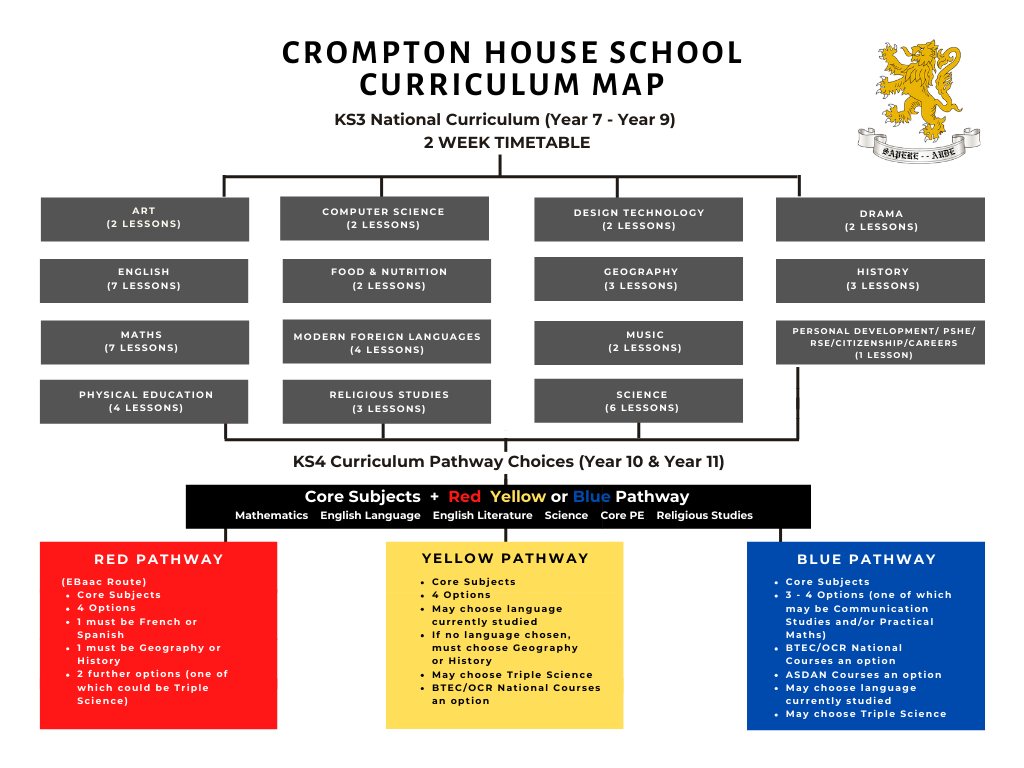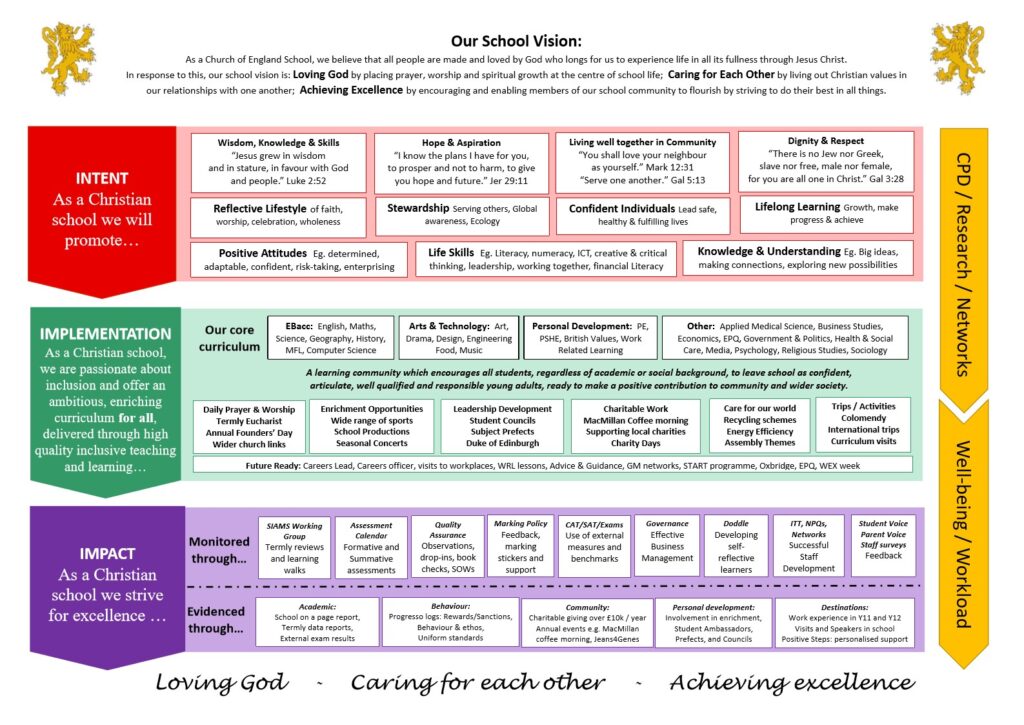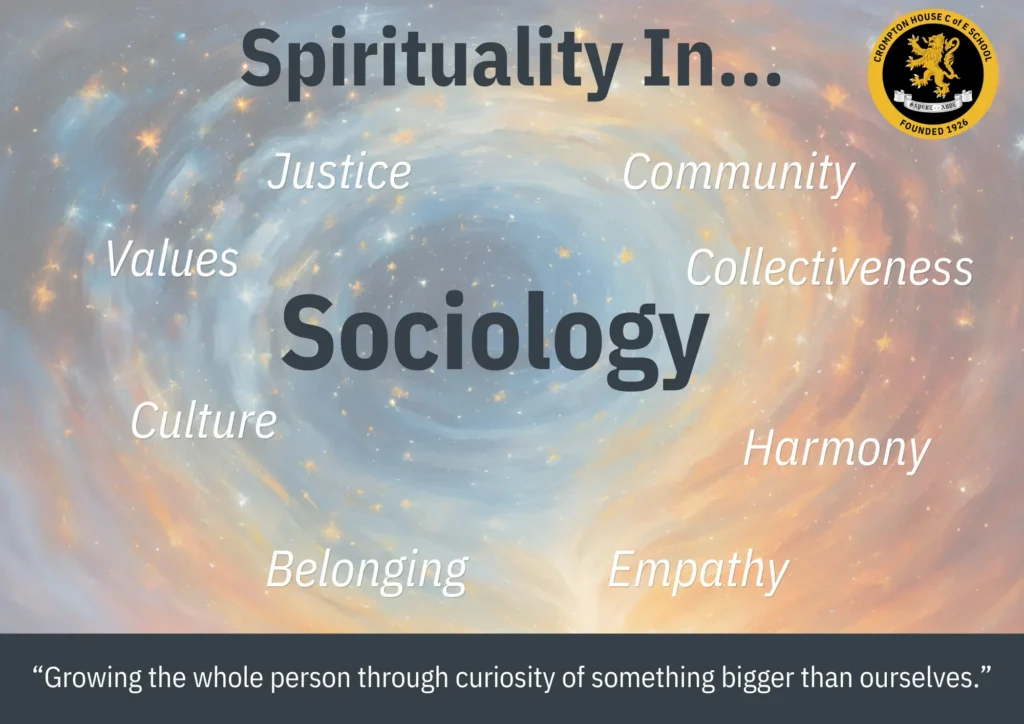Sociology
At Crompton House we aim to create the very best Sociology students. Our aim is to create curiosity in the social world and an understanding of how our actions can shape our social environment. Sociology aims to encourage student to consider the inter-relationships between ourselves and others, and how students will take their place in the wider world as empathetic and thoughtful citizens, these are key to the school’s mission statement.
How clearly are the expectations and goals built into the curriculum? Each module in Sociology carries its own objectives and aims as laid out in the Learning Journey and more specifically in the Medium Term Plans. These aims are conveyed to students within each module so that they can see the end intentions of their learning. How has curriculum content been selected and how does this reflect the vision? Key stage 4 and 5 content in Sociology has been determined by the AQA exam board. This has been the result of investigation of the varying exam boards following new specifications in 2015 and 2017. The AQA specifications reflect our department vision strongly as students develop a clear understanding of major theories of the social world. How does the curriculum develop understanding about key social scientific concepts?
Sociology courses begin with a core module that includes social scientific concepts that are central to the GCSE and A level course. Each of these core concepts is then explored in great depth over the next two years to ensure student comprehension and evaluation of them, preparing them for next steps. At A level, students begin by learning sociological theories such as Functionalism Marxism & Feminism, which are revisited in each and every topic studied thereafter.
We have a two-year curriculum at both KS4 and KS5 which is divided into medium term plans for each topic, challenging the students to deepen their understanding, introducing, and consolidating where appropriate new areas of the language, and promoting links between each new concept. In each topic our medium-term plans show the core and extension objectives which make up our powerful knowledge across the course. Collaborative, detailed, and thorough curriculum planning lies at the heart of the departmental work. We use all available resources and teaching strategies to ensure that students have a comprehensive knowledge of the specifications and can go beyond what is taught in lessons. Techniques to help embed knowledge and help students master subject content are embedded in the curriculum. These are focussed on embedding challenge, metacognition, memory and retrieval techniques, numeracy, and literacy into our departmental curriculum.
To complement the schemes of work and medium-term plans, students also engage in Sociology through student revision conferences with senior examiners and other experienced practitioners. These activities allow students to gain valuable insight into the subject and the demands of the examination. Visits from magistrates and the police are encouraged as well as trips, where possible, to London, Criminology Conferences, Prisons and University faculties.
How do high-quality resources support learning?
Students in Sociology benefit from having to be plugged in to the real world of their subjects. Students in Sociology benefit from the use of subject course and homework booklets which are regularly updated to provide knowledge from exam series and exam marking to provide new, evidence & evaluation of theories. Our retrieval starters are based on questions which promote students’ retention of topics and key powerful knowledge.
In Sociology we also implement our curriculum through using a variety of teaching strategies and learning styles, independent tasks as well as more traditional skills practice. Our overall aim is to give students the knowledge, skills and abilities to understand and make informed decisions. In class, students use a range of learning styles including kinaesthetic card sorts, frequent self-research opportunities, application & evaluation tasks and skills tasks like essay-writing and comparative evaluation. Positive relationships are forged with students and a real love of the subject is fostered through regular real-world application and case studies.
We invest time heavily in subject focused pedagogy. Teacher knowledge is excellent; the timetable allows for A levels to be taught by subject specialists with extensive experience in their subject areas. The department contains teachers with several years’ exam board marking experience.
Curriculum development is a normal and regular part of departmental activities following each exam series. Teaching & assessment at key stage 4 and 5 is focused on the examination requirements set by AQA, for example by embedding routine opportunities for exam practice and paragraph writing. The AQA exam structures are clearly designed for skill development in the field of evaluative thinking, comparison, and essay-writing, to embed and secure skills as well as knowledge.
The curriculum is working in the Social Science department as examination results are consistently above the national average and among the best in the school at GCSE and A-level. The quality of teaching and learning has been praised during learning walks by both external and internal observers. The engagement and subject enjoyment of students in the department is high with many students choosing to study related courses in higher education. Our subject specialists have experience of Sociology at university level and prepare students through constant links between core theoretical learning in sixth form and higher degree level. The AQA A levels provide an excellent grounding in each social science subject ready for university.
Student Outcomes
Students are set high, aspirational targets and the department focusing on using ALPS 3 as the benchmark for student success. Assessment is ongoing through regular in class AFL and major assessment points during each half term. Student outcomes are recorded in assessment folders using trackers to monitor individual progress against targets. This progress is then reported on at learning profile points twice annually. There are 3 internal exams points across the 2-year course allowing students the opportunity for full exam paper practice.
Formative Assessment is integral to everyday teaching within Sociology. It has the needs of our students at its core (to build up confidence and reduce anxiety) and it is embedded into teaching activities within each lesson. We use formative assessment approaches, low stakes testing, questioning and retrieval practice techniques with the aim of preparing our students to embed and use knowledge fluently to improve long term knowledge retention and achieve a greater equity of student outcomes.
Summative Assessments are directly linked to AQA examination questions using past paper questions. PLCs (personalised learning checklists) are used to assess the security and depth of understanding a student has attained against the key course content. They are consistent with departmental schemes of work and test the learning outcomes accurately. Summative assessment helps us to know where our students are making progress and to assess their potential to improve performance overall.
Information from assessment is used to shape future curriculum plans. Following key assessments and mock examinations there is a thorough standardisation and moderation process. External exam markers are used to lead the moderation for relevant papers. Assessments are based on past questions and booklets are constantly updated to reflect new learning form the exam series.






